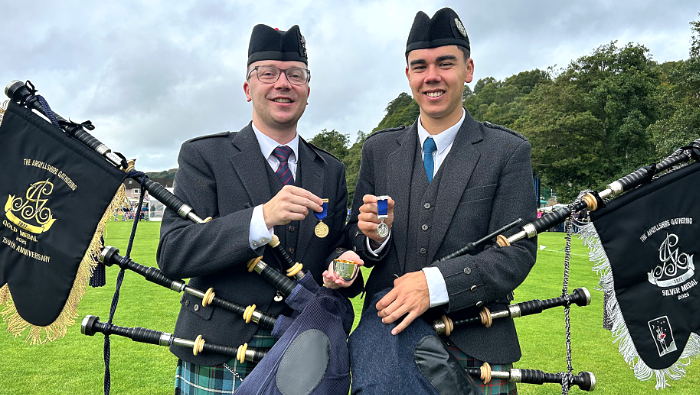
Argyllshire Gathering Day 1. I judged the Silver Medal with Robert Barnes and Donald MacPhee. We started at 9am sharp and finished at 4.30 with a short break for some lunch.
The winner was Kyle Cameron, now a son of Tobermory on Mull. His tune was the shortest in the list, You’re Welcome Ewen Lochiel. The pipe was rich-toned and as rock steady as the finger. Kyle’s only fault was snipping the B before the D throws in the urlar. A strong fosgailte to finish.
By Robert Wallace
Kyle must be one of the few pipers who has won the MacGregor Memorial one year and the Silver Medal the next. He will handle the promotion to the upper level with ease. Second prize went to Jonathon Simpson a consistent performer this summer. He rushed the Var 1 doubling and also the crunluath doubling but this was a respectable Viscount of Dundee, fingered perfectly.
Third went to Ross Miller who might have been higher up had he pushed to the second beat in the taorluath doublings and refrained from overextending the connecting notes in the T&C singlings of MacFarlane’s Gathering.
Fourth went to the best overseas piper on the day, Joseph Biggs from Ontario. He had the same tune and a nice pipe and finger, though the crunluath movement was not consistently rhythmical and he needs more stress on the theme notes in that variation.
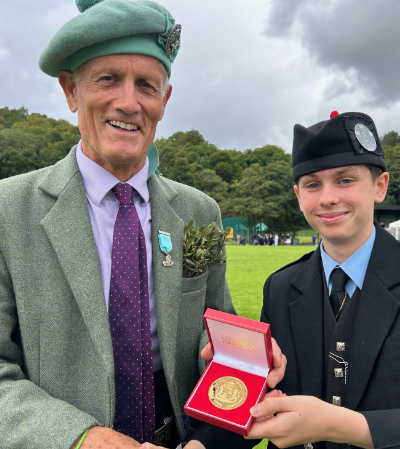
Anna Kummerlöw was given Chisholm’s Salute. She gave it a snappy treatment and rushed the variation doublings. The pipe and finger saw her through to fifth prize however.
Best of the rest was undoubtedly Ruairidh Brown. He had the most commanding pipe of the day. He also crushed the C grip in the Viscount ground and wasn’t always lyrical with chelalo. A wrong note also counted against him.
Keith Bowes was close to the list too. Another excellent bagpipe but the crunluath movement sometimes came across as incomplete and there were large gaps before the cadences in the crunluath singling of Kinlochmoidart 1.
Overall the standard was good only so far as those mentioned above. More teaching, more application, better instruments are needed if some are to progress up the greasy piping pole. Others, good pipers, just crumpled on the day. Re-double for Inverness. Thanks to Neil Jordan for his efficient stewarding of the 25 entrants.
Day 2, and we convened for breakfast in an hotel near the seafront before the march to the games. There was a healthy turnout of pipers all doing the decent thing and supporting the new Gold Medallist up the road.
It has become something of a tradition now that the Silver Medallist takes the P/Sgt’s position and the MacGregor winner is given a place in the front rank, just as it should be:
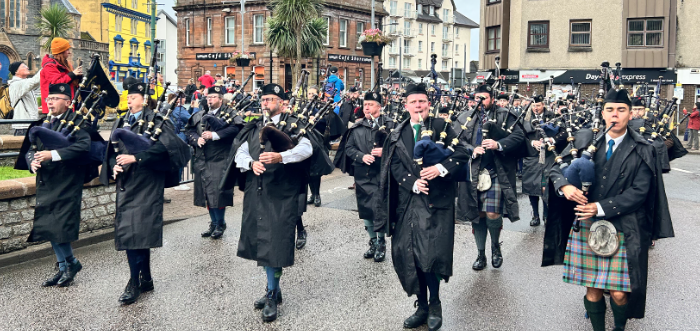
A large crowd followed the pipers into the ground, and after a dram and the presentation of medals, the serious business of the A and B grade light music competitions began. There was a short leet in each with the benches switched for the finals. Around 40 played in the As and 30 in the Bs.
The big winners were Calum Brown, Aberdeen, and Nick Hudson, Texas. Calum secured the Royal Scottish Pipers’ Society Bronze Star for Marches, and Nick the Argyllshire Gathering Silver Medal for Strathspey & Reels.
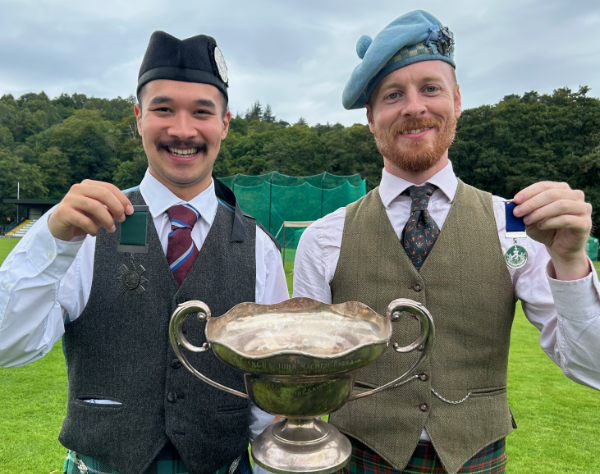
Over in the adjacent field I judged the Intermediate MSR with the remarkable Stuart Liddell. A few days out from winning his fourth World Pipe Band Championship, here he was with another Argyllshire Gathering Champion Piper title under his waistbelt. The best in the world in bands, the best in the world in solos.
I was particularly pleased that he had won the Sen. Piob. with Port Urlar, a tune he had from his uncle Hugh MacCallum who found success with it back in the ’70s. The tune is old and difficult and unconventional in construction. It can be looked at many ways. (Have a read of p389 in the Society collection.)
Modern tunes have none of that. Mostly they are good tunes, but they are popular for another reason: the competitor never has to worry that a judge will say ‘that’s not the way MacDougall Gillies played it’, or ‘I prefer such and such a setting’.
Your Port Urlars and other ancient pieces are open to all sorts of discussion on an educated bench. The piper who puts them in has an additional dynamic to contend with that the one with the new piece does not.
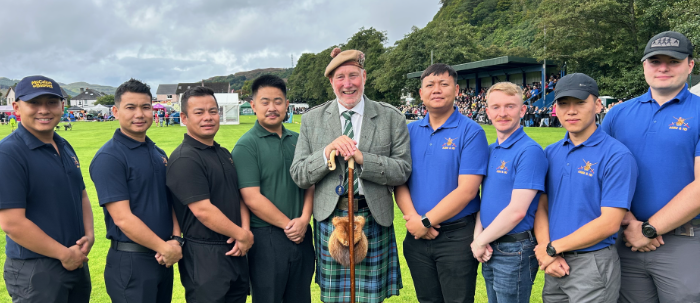
The Intermediate MSR for the P/M RG Hardie Memorial Trophy was introduced to give the young pipers playing in the MacGregor Memorial Piobaireachd something to do on games day. It has been a successful innovation.
There is one rule the administrators are very strict on: if you don’t play in the MacGregor you don’t play in the Hardie. They anticipated that one day they might get the odd piper who enters the MacGregor, fails to get the tunes up in time, and rolls up to the games park hoping to snatch success. Pleasing to see that they stuck to this last Thursday.
Twenty nine entered, each submitting three tunes of each. The winner was Eala Niamh McElhinney, a piper with the Police and Federation band, and a student of Margaret Houlihan. Eala played beautifully, a steady instrument projecting clean technique.
She caught the idiom of P/M George Ross, Black Watch, Catlodge and Lord MacDonald perfectly and kept control to the end. A very worthy winner.
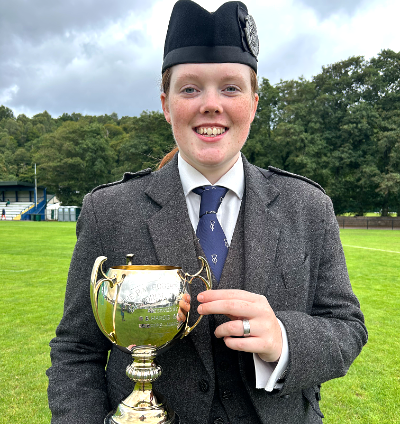
Close on her heels was Douglas Baird from Torphichen, West Lothian. Douglas was unaware of the piping heritage of his home town. (P/M Sandy Forrest of the Torphichen & Bathgate band was a student of John MacDougall Gillies and taught Donald Shaw Ramsay.) Douglas assured me he was ready to uphold the tradition, and made his way to the boards. He played Clan MacColl, Tulloch Castle and Cecily Ross with consistency and clarity, with only one small slip in the reel counting against him.
Chris McCartan was third with Inveran, John Roy Stewart and RMS Athenia. A big lad, Chris commanded the platform. Perhaps it was the cold, but a few misses detracted from his clean, musical performance.
Arran Green was fourth. Arran has a very professional demeanour and an excellent bagpipe. Unfortunately his work was all a bit tight, particularly noticeable in his march, Hugh Kennedy. The small notes are part of the melody too Arran and we need to hear them. His other tunes were Maggie Cameron and Kalabakan.
Fifth prize went to MacGregor winner Andrew Pattison, first on with David Ross, Rosehall, Lady Loudon, and Dr MacPhail. A good attempt, but he had several misses and an occasional suspect E doubling from F. The placing was enough to give Andrew the title of Intermediate Champion Piper for which he received the Angus Nicol Memorial Silver Medal:
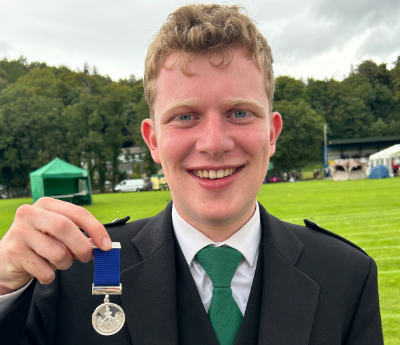
Before closing a word for young Bobby Allen from Chryston: two firsts in the B grade March and Strathspey and Reel gave him the B Grade Champion Piper title, the Angus Nicol Quaich and an extra £100 to add to his £190. Congratulations Bobby.
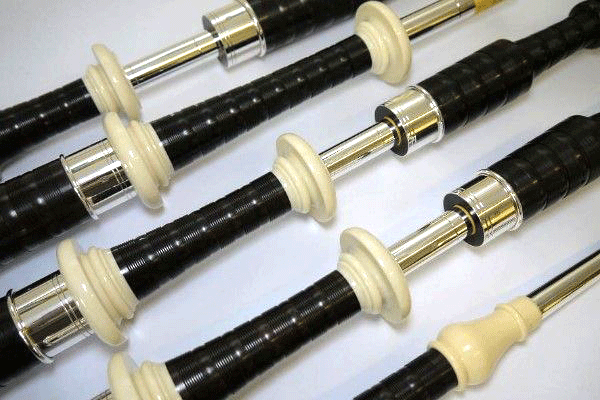
Bagpipes – DN4A – High Quality Set in Plain Silver
The DN4A bagpipe by David Naill is a high quality, mid-level bagpipe in African blackwood, fully beaded and combed. The DN4A model features plain, hallmarked sterling silver and comes standard with a backwood pipe chanter, beaded silver ring caps and silver mouthpiece tube, Canmore synthetic bag (hide bags on request), with velvet cover and silk cords (zipper bag extra). There’s a choice of gre…
















Your reflections and expertise are so good and so worth reading.
Thank you
In addition to all the other worthy winners Cameron Bonar won the Jig in a huge class of 57 at the Argyllshire Gathering.The following day he won the Jig competition at Lochaber and two days later in a haul of 5 at Chatsworth in Derbyshire he won the Jig again. Remarkable achiement for this young Piper.